Introduction
Navigating the regulatory landscape for medical device studies in Colombia presents a unique set of challenges and opportunities for researchers and organizations alike. With oversight from the Instituto Nacional de Vigilancia de Medicamentos y Alimentos (INVIMA), understanding the intricacies of local regulations, ethics committee roles, and international standards is crucial for successful study execution.
This article delves into the essential components of conducting pivotal studies, including:
- Site selection
- Recruitment strategies
- Design of effective study protocols
- Quality control measures
By employing best practices and maintaining compliance, stakeholders can position their clinical trials for success in a rapidly evolving research environment.
Understanding the Regulatory Landscape for Medical Device Studies in Colombia
In Colombia, pivotal studies for medical device approval are governed by the Instituto Nacional de Vigilancia de Medicamentos y Alimentos (INVIMA), which manages the approval procedure and ensures adherence to local regulations. A thorough understanding of the following key components is essential for successfully navigating this regulatory landscape:
- The Pivotal Studies for Medical Device Approval involve examining the specific guidelines established by INVIMA for medical device studies, which encompass necessary documentation and submission protocols. Following these guidelines is essential for compliance and is crucial for the pivotal studies for medical device approval, enabling a smoother approval.
- Ethics Committees: Acknowledge the crucial function of ethics committees in assessing the ethical dimensions of research studies. These committees are essential to the approval process, ensuring that participants' rights and welfare are protected throughout the research. However, many RECs reported inadequate onsite monitoring, relying primarily on annual reports from researchers, which may compromise participant protection. This highlights the need for RECs in the Mesoamerican region to enhance their compliance with international ethical guidelines.
- Global Guidelines: Acquaint yourself with global guidelines like ISO 141, which outlines good practices for conducting studies involving human participants. Compliance with these standards enhances the credibility and quality of your research.
- Local Regulations: Remain vigilant about any amendments to local regulations that could affect your research. Continuous monitoring of these changes is essential to maintain compliance and uphold the integrity of your research. As Ruth Macklin, PhD, pointed out, "The absence of financial resources to perform active site monitoring hinders guaranteeing not only the quality of the research process but also, specifically, the safeguarding of rights and welfare of participants in research studies."
The process for obtaining clinical research approval in Colombia is crucial, particularly for pivotal studies for medical device approval, which requires first getting approval from your site's institutional review board (IRB)/ethics committee (EC), followed by approvals from INVIMA and the Ministry of Health (MoH). Additionally, you will need to secure an import permit at Colombia's Ministry of Industry and Commerce (MinCIT) to ship your investigational devices for the pivotal studies for medical device approval.
- Comprehensive Clinical Trial Management Services: Utilize services that include feasibility assessments, site selection, compliance reviews, trial setup, import permits, project management, and reporting to advance your medical device trials efficiently. Katherine Ruiz, a Regulatory Affairs expert, can guide you through obtaining market clearance in Colombia, ensuring that your research meets all regulatory requirements.
By thoroughly grasping and following this regulatory framework, you can guarantee that your essential research, particularly the pivotal studies for medical device approval, not only meets required guidelines but is also strategically positioned for success in the research landscape.
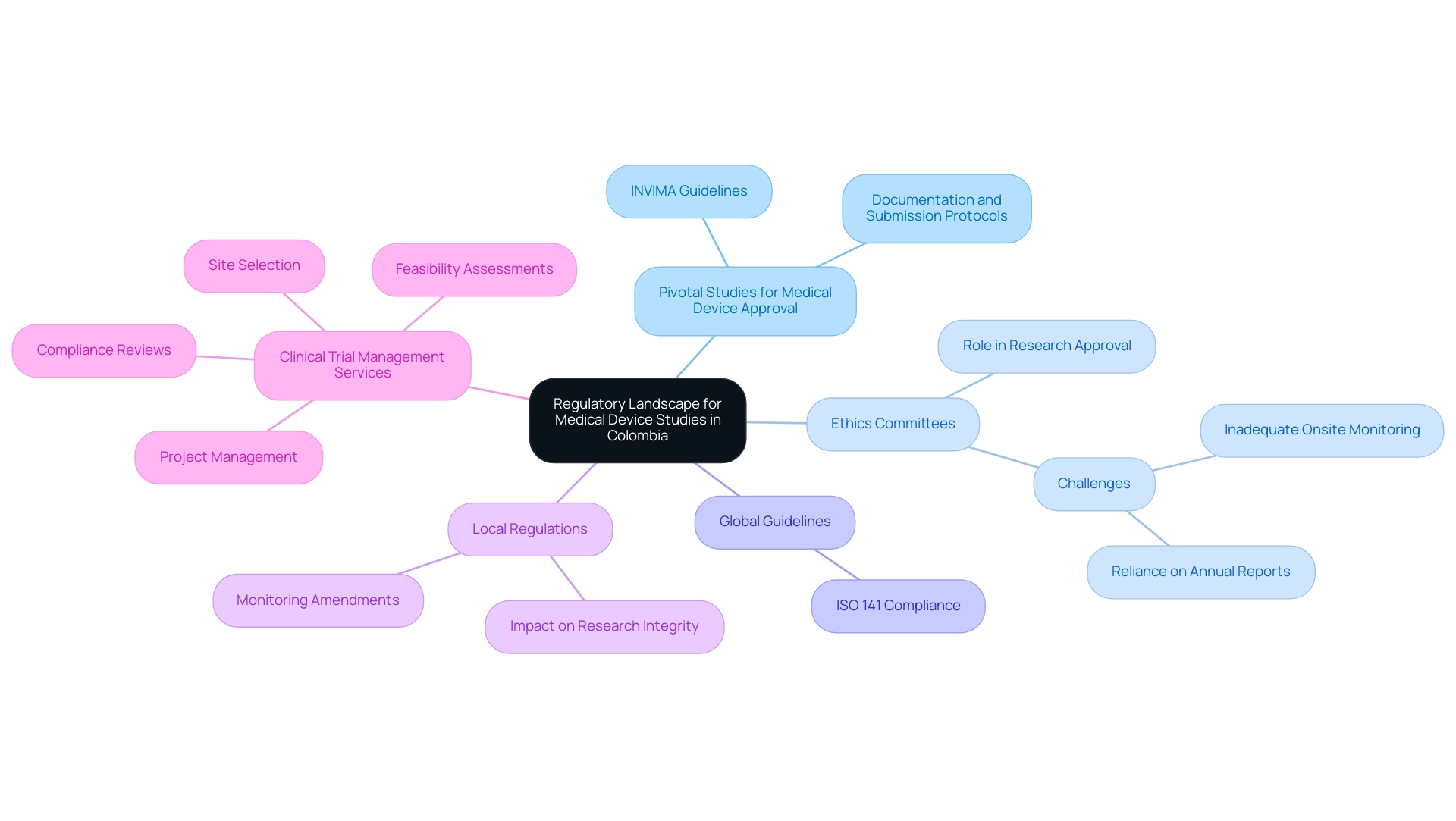
Best Practices for Conducting Pivotal Studies: Site Selection and Recruitment Strategies
Achieving successful outcomes in crucial research necessitates the implementation of several best practices:
- Site Selection: Prioritize locations that have shown expertise in executing research projects, especially in Latin America, ensuring they have the necessary infrastructure to support your investigation. For instance, bioaccess™ and Caribbean Health Group's collaboration aims to position Barranquilla as a leading destination for clinical trials, demonstrating how selecting sites with prior experience can significantly influence recruitment success and overall trial outcomes. This initiative is further supported by Colombia's Minister of Health, emphasizing the governmental backing for the project.
- Recruitment Strategies: Formulate targeted recruitment strategies that leverage outreach to healthcare providers, patient advocacy organizations, and various online platforms. The partnership between GlobalCare Clinical Trials and bioaccess™ has demonstrated success in reducing recruitment times by over 50%, showcasing the effectiveness of comprehensive recruitment efforts.
- Patient Engagement: Build strong relationships with potential participants by offering clear, concise information regarding the study's purpose, benefits, and associated risks. It's crucial that the informed consent process is transparent and readily comprehensible to all participants, fostering trust and engagement.
- Monitoring Recruitment Progress: Continuously track recruitment metrics and be prepared to adjust strategies as necessary to meet enrollment goals. Statistics reveal that 39% of studies revised their original sample size targets, with 71% of these adjustments being downward. This underscores the importance of dynamic recruitment strategies that can adapt to evolving circumstances in the field.
Implementing these best practices not only enhances the likelihood of successful participant recruitment but also boosts overall site performance. As Tiffany Ashton, Director of Operations and Clinical Trial Manager, aptly states,
Recruitment and retention are a team effort—and when we work together toward a common goal, we are more likely to achieve success.
By promoting teamwork and following established methods, studies carried out in Latin America can greatly enhance their success rates. Additionally, bioaccess™ provides a variety of clinical trial management services, including feasibility assessments, site selection, compliance reviews, trial setup, import permits, project management, and reporting, which are essential for navigating the complexities of clinical trials.
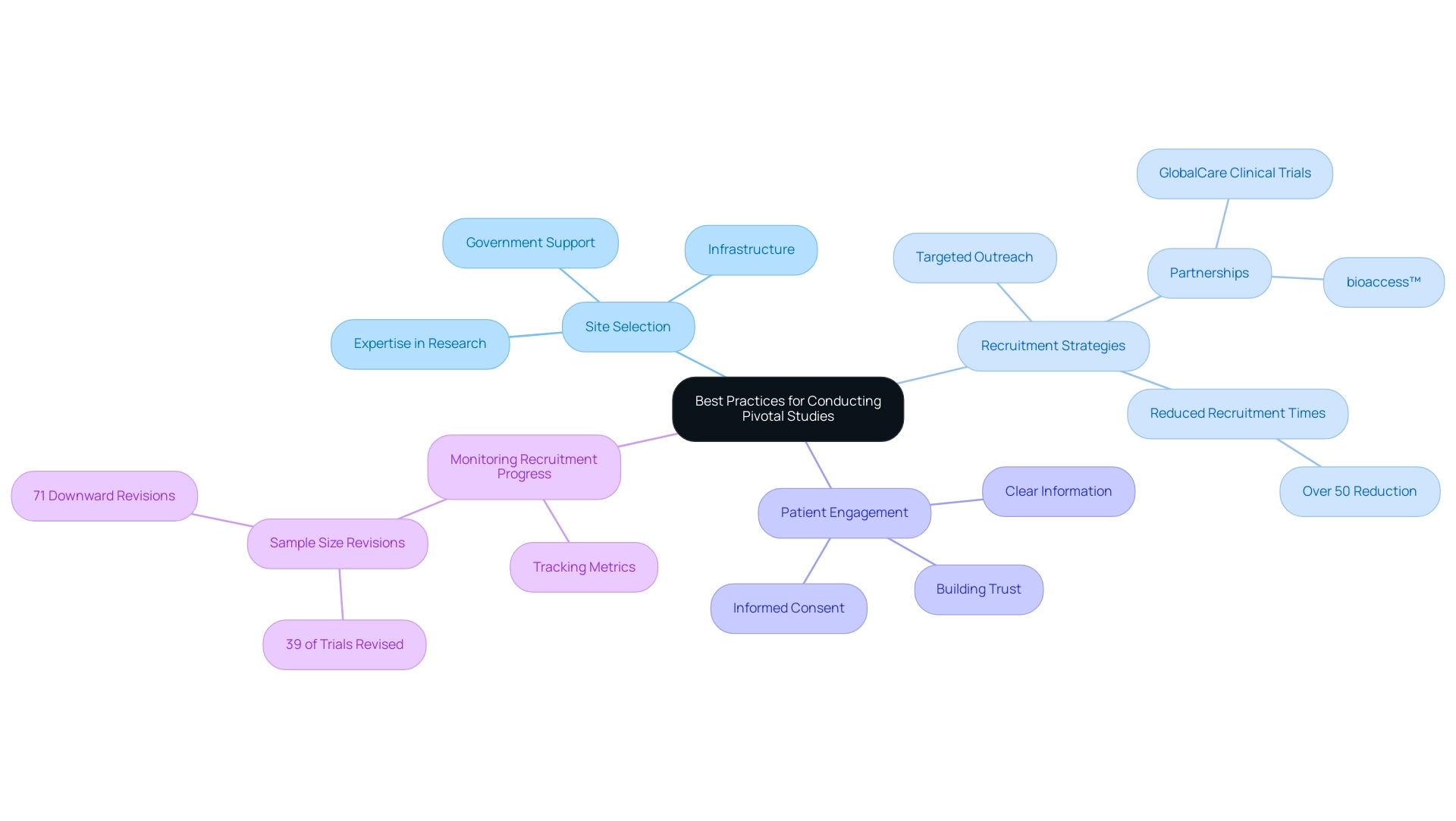
Designing Effective Study Protocols for Clinical Trials
When designing research protocols, especially for pivotal investigations in Latin America, it is essential to incorporate several key elements to ensure clarity and effectiveness:
-
Objectives and Hypotheses: Begin by clearly outlining the project's objectives and formulating testable hypotheses. A clearly defined research question that is answerable, feasible, and clinically relevant is crucial, as emphasized by bioaccess®'s expertise in Early-Feasibility and First-In-Human trials. Case analyses such as 'Importance of Research Question Development' illustrate how poorly defined objectives can result in failures. Properly constructed hypotheses guide the research process and influence clinical practice.
-
Study Design: Choose a suitable research design, such as a randomized controlled experiment or cohort analysis, that directly addresses the research questions. The choice of design significantly impacts the validity of the results and the conclusions drawn from the study.
-
Inclusion and Exclusion Criteria: Establish clear criteria for participant selection. This helps ensure that the research population is representative and relevant, ultimately enhancing the external validity of the findings. bioaccess® assists in the feasibility and selection of research sites and principal investigators, ensuring robust participant recruitment.
-
Endpoints and Outcomes: Define primary and secondary endpoints, specifying how they will be measured and analyzed. This clarity is critical in assessing the effectiveness of interventions and the overall success of the trial. bioaccess® offers comprehensive reporting on project status and outcomes, which is essential for ongoing evaluation.
-
Statistical Analysis Plan: Outline the statistical methods to be employed in data analysis. Ensuring that these methods are appropriate for the selected research design is crucial for obtaining reliable results. As noted by Bland and Altman,
One-sided hypothesis testing should never be used as a device to make a conventionally non significant difference significant,
highlighting the importance of robust statistical planning.
-
Timeline and Milestones: Provide a detailed timeline that outlines key milestones and deliverables throughout the research. A well-structured timeline aids in project management and helps track progress effectively. bioaccess® excels in project management and monitoring, ensuring timely adherence to milestones.
-
Regulatory Compliance: bioaccess® places a strong emphasis on ensuring regulatory adherence throughout the pivotal studies for medical device approval in Colombia. This includes navigating complex regulations and obtaining necessary approvals from ethics committees and health ministries. Our group's vast experience in the Latin American market strengthens our capability to assist clients through the pivotal studies for medical device approval in Colombia.
By carefully integrating these components into your research protocol, you will improve the clarity and efficacy of your design, thus boosting the chances of positive results. Furthermore, it is important to mention that Dr. Bhandari received funding, in part, from a Canada Research Chair at McMaster University, emphasizing the importance of well-structured research protocols in obtaining research funding. Additionally, bioaccess® has a demonstrated history of successful research, with metrics showing a high rate of participant retention and regulatory approval, further reinforcing our reputation as a prominent collaborator in medical investigations.
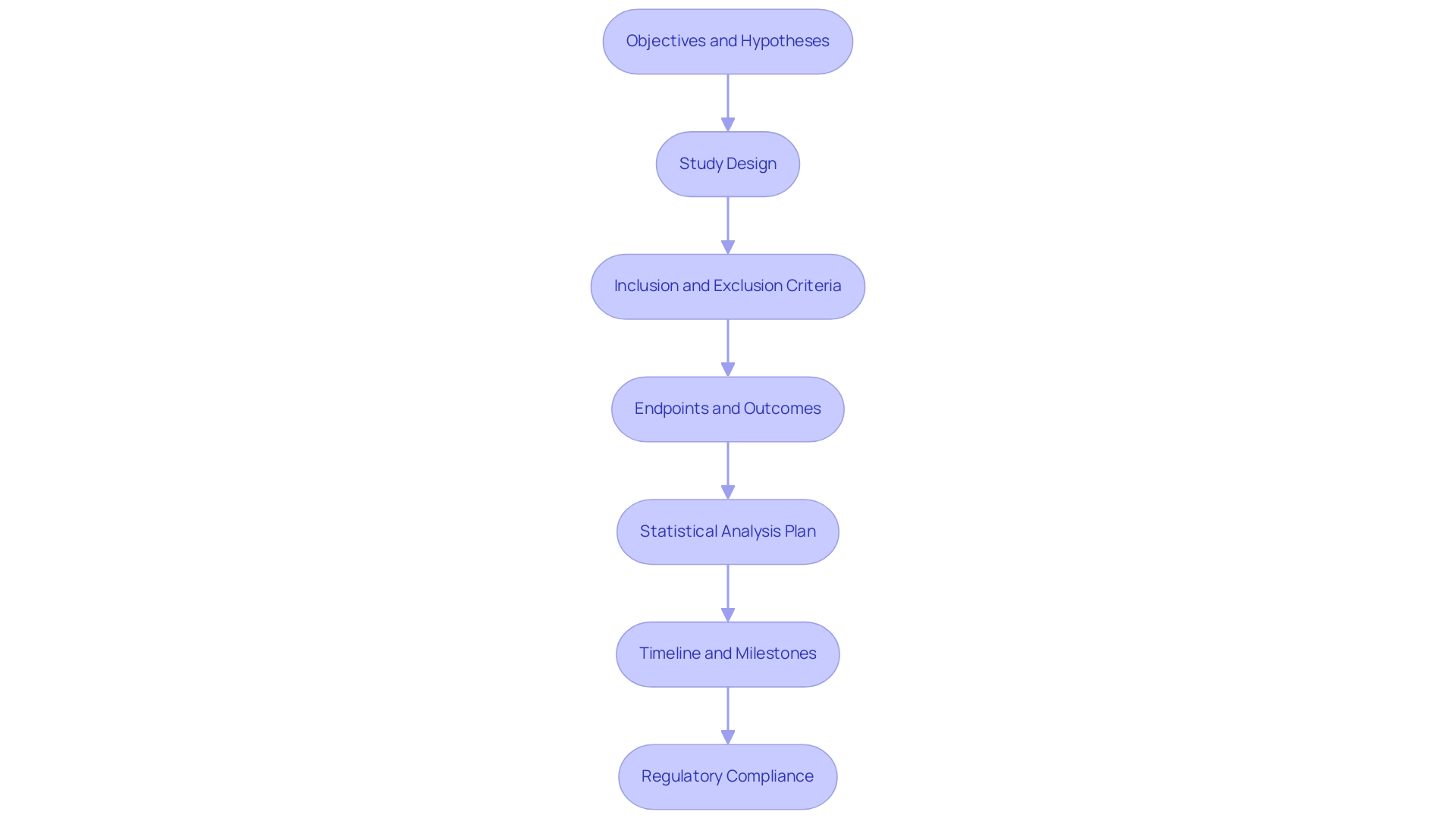
Implementing Quality Control Measures in Clinical Trials
To ensure the highest quality in your clinical trials, particularly pivotal studies, it is essential to implement robust quality control measures, including:
-
Standard Operating Procedures (SOPs): Establishing and adhering to comprehensive SOPs is crucial for all aspects of the study, from data collection to monitoring and reporting. As highlighted in recent expert discussions, the steps in creating an SOP include:
-
Identifying the process
-
Gathering input from relevant stakeholders
-
Drafting the document according to regulatory guidelines
-
Reviewing and revising based on feedback
-
Obtaining necessary approvals
-
Ensuring thorough training and communication with all personnel involved
Remember, "Success is the sum of small efforts, repeated day-in and day-out" (Robert Collier), which underscores the cumulative impact of these SOPs on trial quality.
-
-
Training and Certification: It is vital to ensure that all team members receive adequate training and certification, particularly in Good Clinical Practice (GCP). This not only enhances individual competency but also contributes to the overall integrity of the research. As Wayne Dye aptly stated, "Be miserable. Or motivate yourself. Whatever needs to be accomplished, it's always your choice," highlighting the significance of motivation in this endeavor.
-
Monitoring and Auditing: Regular monitoring visits and audits are necessary to assess compliance with the study protocol and regulatory requirements. These activities, supported by bioaccess®'s expertise in project management and compliance reviews, help identify any deviations early, allowing for timely corrective actions.
-
Data Management: Implementing rigorous data management practices is essential to maintain data integrity. This encompasses processes such as data entry verification and validation to minimize errors and inconsistencies in the data gathered during the study.
-
Corrective and Preventive Actions (CAPA): Establishing a CAPA system is critical for addressing any identified issues promptly and preventing their recurrence. This proactive approach, which is a hallmark of bioaccess®'s service offerings, not only enhances the reliability of your studies but also fosters a culture of continuous improvement.
By prioritizing these quality control measures, along with utilizing the comprehensive clinical management services available through bioaccess®, including feasibility assessments, site selection, setup, and expertise in Early-Feasibility Assessments (EFA) and First-In-Human Assessments (FIHA), you significantly enhance the reliability and credibility of your clinical results, which are crucial for the pivotal studies for medical device approval in Colombia, ultimately leading to improved outcomes and adherence to industry standards.
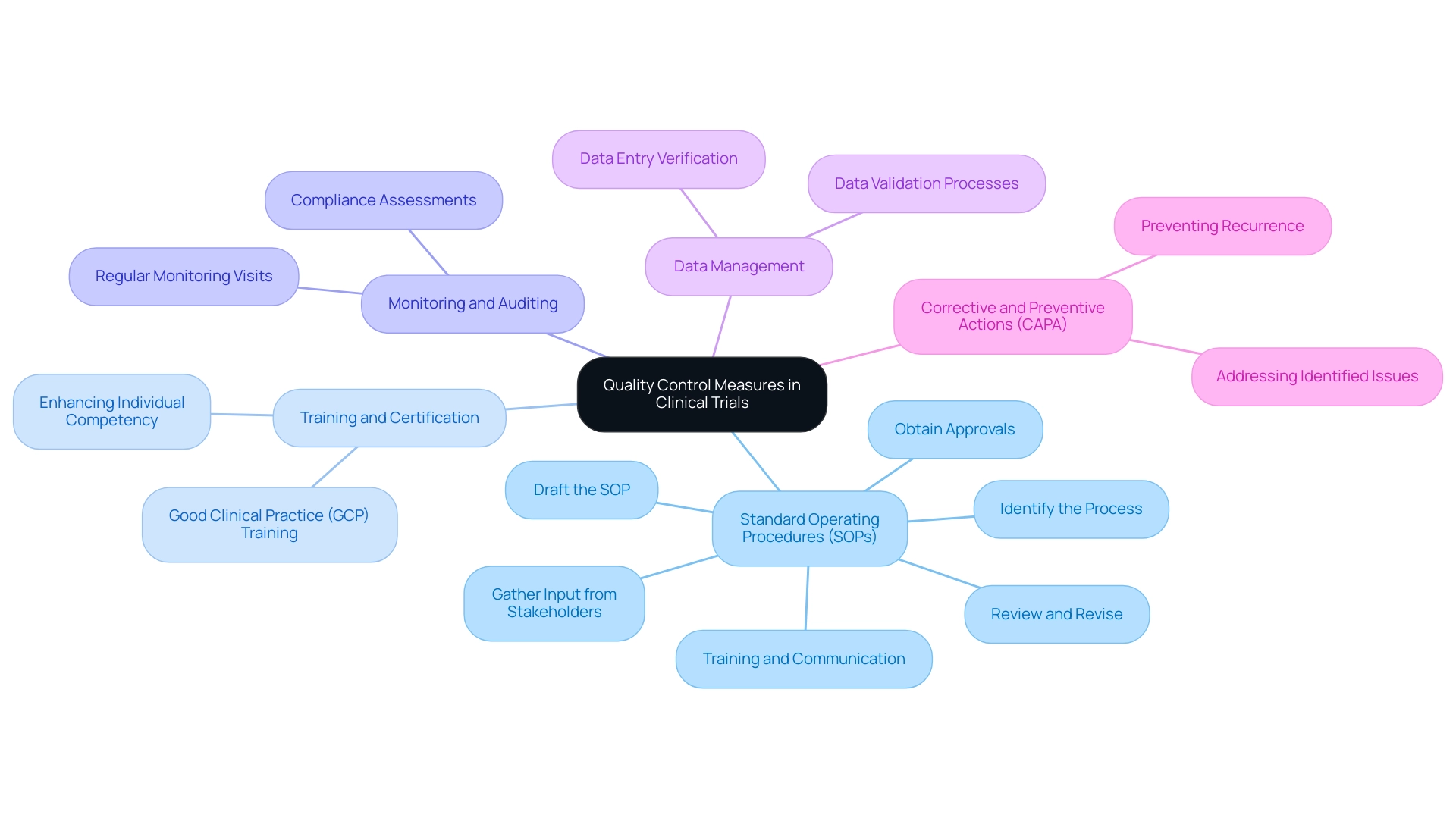
Analyzing Results and Preparing for Full-Scale Trials
Upon completing your pivotal research, follow these critical steps to effectively analyze results and prepare for full-scale trials:
- Data Analysis: Employ robust statistical methods to analyze the collected data, ensuring a thorough assessment of both primary and secondary endpoints. This method is essential for drawing accurate conclusions from the research findings. For instance, in ReGelTec's Early Feasibility Study involving HYDRAFIL™ for chronic low back pain in Colombia, comprehensive data analysis was crucial for the pivotal studies for medical device approval Colombia to evaluate treatment efficacy.
- Interpreting Results: Carefully evaluate the results within the context of the research objectives, taking into account their implications for the efficacy and safety of the medical device. This interpretation should align with best practices in statistical analysis, as highlighted in the case of Flow-FX's first-in-human clinical trial of the Flow-Screw device for intraosseous antibiotic delivery in Colombia, which emphasized the importance of context in understanding outcomes, particularly in the framework of pivotal studies for medical device approval Colombia.
- Preparing Reports: Compile detailed reports that encompass the study design, methodology, results, and conclusions. It is crucial that these reports adhere to regulatory requirements to facilitate transparency and compliance. GlobalCare Clinical Trials' recent partnership with bioaccess™ exemplifies effective reporting practices that led to significant reductions in recruitment time and high retention rates, contributing to pivotal studies for medical device approval Colombia.
- Stakeholder Communication: Effectively communicate findings to all stakeholders, including sponsors, regulatory bodies, and ethics committees. Highlight the significance of the results, ensuring that the implications are understood and considered in future decision-making processes. Engaging stakeholders by addressing the four key questions for evaluating study results can foster a comprehensive understanding of the findings.
- Planning for Full-Scale Testing: Based on your analysis, create a comprehensive plan for full-scale testing. This should encompass timelines, resource distributions, and any essential modifications to the research framework, reflecting current trends and optimal methods in preparation for experiments. Bioaccess® provides essential services such as feasibility studies, trial setup, project management, and compliance reviews, which can help navigate the complexities of clinical studies in Latin America, particularly in conducting pivotal studies for medical device approval Colombia.
By meticulously following these steps, you will not only analyze your study results effectively but also strategically prepare for the subsequent phase of the medical device approval process.
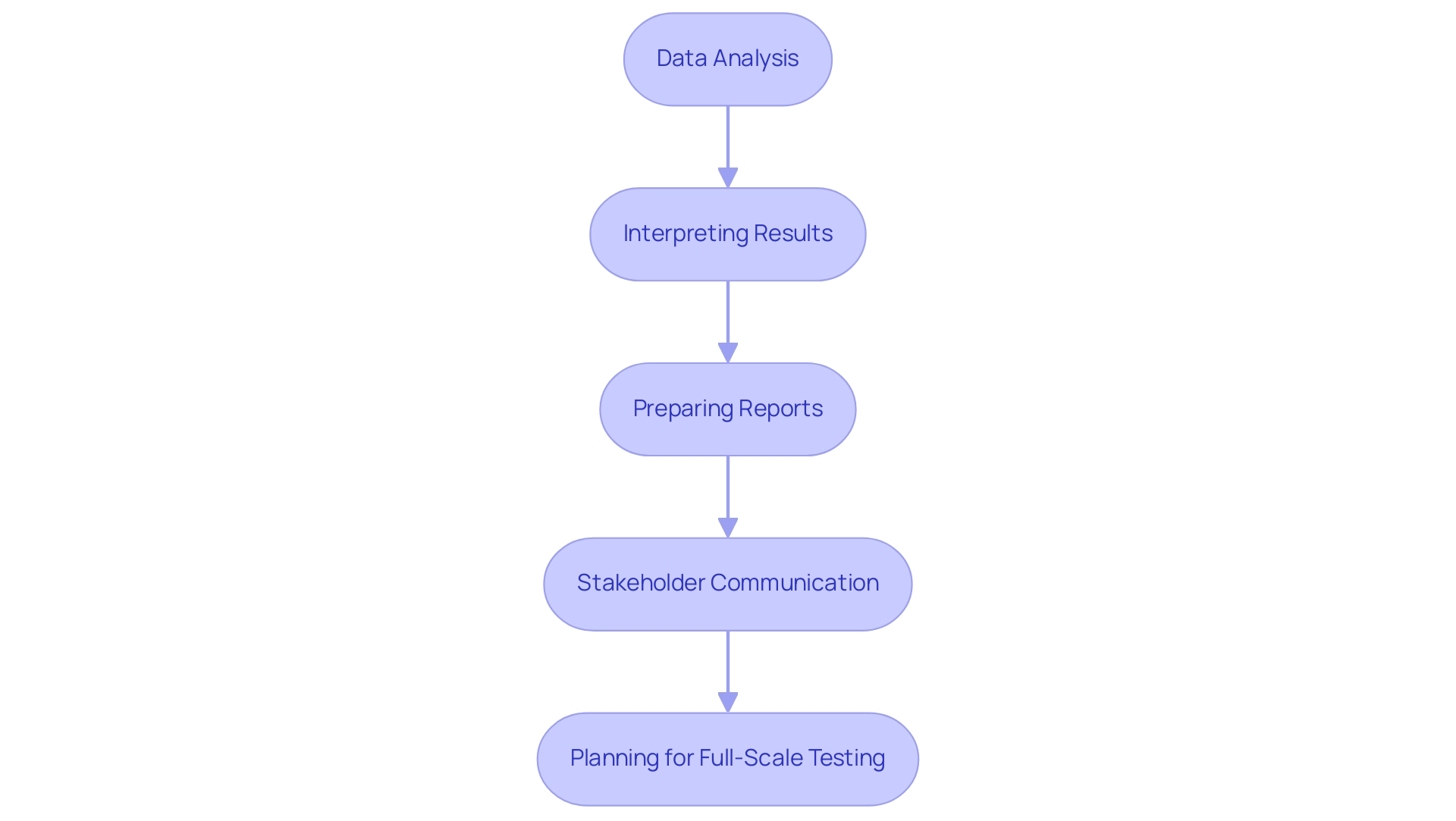
Conclusion
Navigating the regulatory landscape for medical device studies in Colombia requires a comprehensive understanding of several critical components. Thorough familiarity with INVIMA guidelines, the role of ethics committees, and international standards ensures compliance and enhances the credibility of research endeavors. Additionally, being aware of local regulatory changes and the approval process is vital for maintaining integrity throughout the study.
Successful pivotal studies hinge on best practices in site selection and recruitment strategies. Choosing experienced sites and employing targeted recruitment can significantly influence trial outcomes. Engaging potential participants through clear communication fosters trust, while adaptive recruitment strategies ensure enrollment goals are met despite challenges.
Designing effective study protocols is essential for clarity and success. Key elements such as well-defined objectives, appropriate study designs, and robust statistical analysis plans contribute to the overall quality of the research. Furthermore, implementing stringent quality control measures, including SOPs, training, and regular audits, is crucial in upholding data integrity and compliance with industry standards.
Finally, after completing pivotal studies, meticulous data analysis and stakeholder communication pave the way for successful full-scale trials. By strategically planning for the next phase based on comprehensive analysis, researchers can enhance their chances of medical device approval.
In conclusion, by adhering to regulatory frameworks, implementing best practices in study design and execution, and maintaining rigorous quality control, stakeholders can effectively navigate the complexities of clinical trials in Colombia. This strategic approach not only positions studies for success but also contributes to the advancement of medical research in a rapidly evolving landscape.
Frequently Asked Questions
What governs the pivotal studies for medical device approval in Colombia?
The pivotal studies for medical device approval in Colombia are governed by the Instituto Nacional de Vigilancia de Medicamentos y Alimentos (INVIMA), which manages the approval procedure and ensures adherence to local regulations.
What are the key components essential for navigating the regulatory landscape for medical device approval in Colombia?
The key components include understanding the guidelines established by INVIMA for medical device studies, the role of ethics committees, global guidelines like ISO 141, local regulations, and utilizing comprehensive clinical trial management services.
What is the role of ethics committees in the approval process?
Ethics committees assess the ethical dimensions of research studies, ensuring that participants' rights and welfare are protected. However, many committees have reported inadequate onsite monitoring, which highlights the need for improvement in compliance with international ethical guidelines.
Why is it important to be aware of global guidelines like ISO 141?
Familiarity with global guidelines such as ISO 141 helps ensure good practices in conducting studies involving human participants, which enhances the credibility and quality of the research.
How can researchers maintain compliance with local regulations in Colombia?
Researchers should continuously monitor any amendments to local regulations that may affect their research to maintain compliance and uphold the integrity of their studies.
What is the process for obtaining clinical research approval in Colombia?
The process involves first obtaining approval from the site's institutional review board (IRB) or ethics committee, followed by approvals from INVIMA and the Ministry of Health (MoH), as well as securing an import permit from the Ministry of Industry and Commerce (MinCIT).
What services can help advance medical device trials in Colombia?
Comprehensive clinical trial management services can assist with feasibility assessments, site selection, compliance reviews, trial setup, import permits, project management, and reporting.
What best practices should be implemented for successful participant recruitment in clinical trials?
Best practices include site selection, targeted recruitment strategies, patient engagement, and monitoring recruitment progress to adjust strategies as necessary.
What are the essential elements to incorporate when designing research protocols for pivotal investigations?
Essential elements include clearly defined objectives and hypotheses, appropriate study design, inclusion and exclusion criteria, defined endpoints and outcomes, a statistical analysis plan, a detailed timeline, and regulatory compliance.
What quality control measures are crucial for ensuring the quality of clinical trials?
Key quality control measures include establishing standard operating procedures (SOPs), ensuring training and certification for team members, conducting regular monitoring and audits, implementing rigorous data management practices, and establishing a corrective and preventive actions (CAPA) system.
What steps should be taken after completing pivotal research to prepare for full-scale trials?
Steps include conducting data analysis, interpreting results, preparing detailed reports, communicating findings to stakeholders, and planning for full-scale testing based on the analysis.

